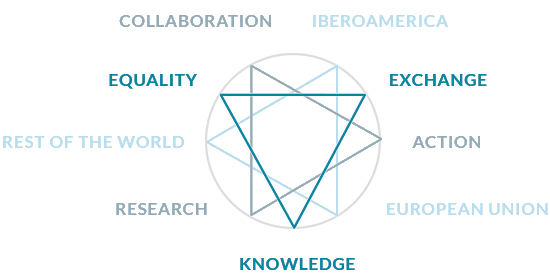THE PROJECT
The Innovative Triangular Cooperation for a New Development Agenda project seeks to contribute to building an innovative model for triangular cooperation (TC) between Latin America and the EU, which, in alignment with the 2030 Agenda, promotes more and better TC.

BACKGROUND
At a time when the international development cooperation system is evolving and adapting fully to the set of global challenges, South-South and Triangular Cooperation (SSTC) is increasingly recognised as a fundamental component for tackling the multidimensional and dynamic nature of development processes.
This is demonstrated by the recognition given by the 2030 Agenda for Sustainable Development to SSTC as a means of implementing the Sustainable Development Goals or the growing role of more horizontal and flexible cooperation, two key elements in the definition of SSTC, which includes the New European Consensus on Development adopted in 2017.
Within this emergency framework of SSTC as a key element for tackling development challenges, where the European Union recognises Latin America as a natural option for progressing in a new approach to international cooperation, the SEGIB, an international benchmark and leader in the Ibero-American region in SSTC, and the EU’s Directorate-General for International Cooperation and Development (DG DEVCO) signed, in November 2019, a grant contract for external actions to co-finance the Innovative Triangular Cooperation for a New Development Agenda project.
GOAL
In the two years it has been underway and within the framework of a multidimensional, comprehensive and dynamic conception of development processes, the Innovative Triangular Cooperation for a New Development Agenda project seeks to generate tools and to drive processes that contribute substantially to building an innovative TC model between Ibero-America and the EU in alignment with the 2030 Agenda.
To this end, a collective research-action-based construction strategy has been set in motion, combining technical dialogue with political discussion and negotiation that guarantees the achievement of consensus.
PILLARS OF THE PROJECT
The project is based on two pillars that are being worked on simultaneously. Both share the search for the necessary consensus so that triangular cooperation actors engage with the conceptualisations and tools generated within the framework of the action.
Pilar 1: More and better Triangular Cooperation
Centred on the generation of knowledge and its application to specific tools that improve the functioning of triangular cooperation. It focuses on four key questions:
- The contribution of triangular cooperation to the 2030 Agenda.
- Decentralised triangular cooperation, especially that involving cities.
- Triangular cooperation that leaves no one behind. Better strategies for working with vulnerable groups, basically indigenous populations.
- Improving the quality of regional triangular cooperation information systems.
Pilar 2: Towards an innovative Triangular Cooperation model
Based on the findings of pillar I and on the experiences and visions of triangular cooperation actors, pillar II seeks to generate relevant knowledge for triangular cooperation policies relative to four issues:
- The strategic importance of triangular cooperation within the framework of a strengthened association between Latin America and the EU.
- The identification and roles of new actors.
- The characterisation and proposal of the most appropriate topic areas and instruments for triangular cooperation between Latin America and the EU.
- The institutional transformations necessary for an effective adaptation to the new TC context.